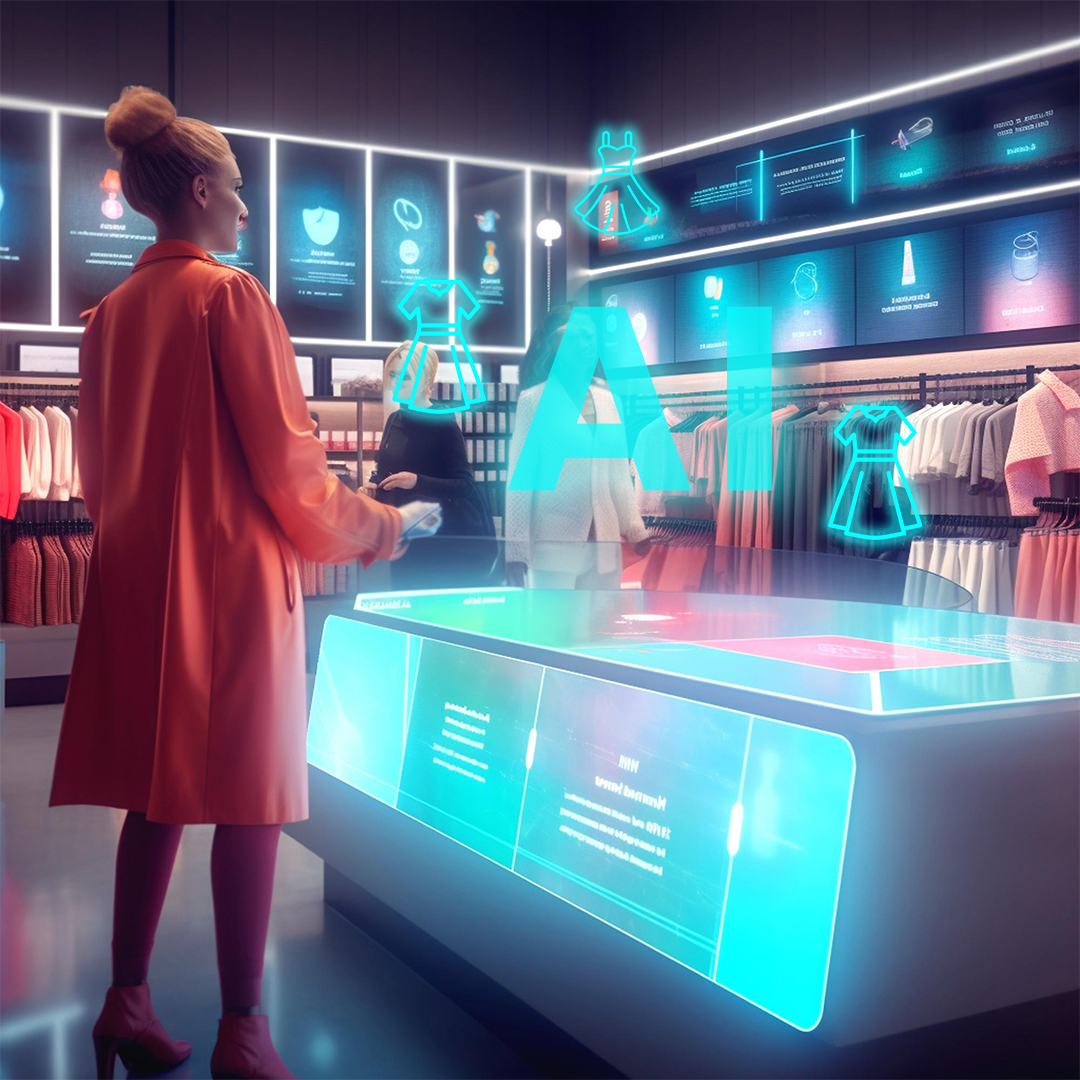AI Role in Consumer Goods Starting with Recommendations to Immersive Try-Ons
The AI role in product recommendations is of great importance these days. Customer profiles and recommendation engines are becoming increasingly popular with the help of artificial intelligence. This has caused businesses to move globally with AI-driven retail. We now live in the "hyper-personalized experiences'' era, where we spend our money on rewards and needs. The role of artificial intelligence in retail technology is the major reason why this is happening besides software development.
Interestingly, several industry competitors recently used generative AI and other forms of artificial intelligence. This has raised the bar for professional AI development and smart retail. Traditional and discrete methods of running AI in the background of ecommerce websites are over. The new reality for companies in the Consumer Packaged Goods (CPG) market is to ensure users and customers are fully aware of the AI role in consumer goods.
As a result, every business partners with an expert open-source ecommerce development services company to develop powerful websites. They also implement technology such as AI in consumer goods to power personalization.
So, how well should you consider the AI role in the consumer goods industry? Let’s find out.
Understanding AI Role in The Consumer Goods Industry
The basic goal of artificial intelligence is to automate processes without human intellect, allowing them to be completed more rapidly and on a larger scale. This is how AI’s role in consumer goods benefits every industry. In the context of the Consumer Goods sector, AI-driven retail has been responsible for enabling positive product experiences and for getting us excited to buy things. In the realm of machine learning (ML), this type of AI application is known as a recommendation engine.
It is an algorithm that combines previous user interactions and experiences with certain things in retail technology to forecast your chances of preferring comparable options. This smart retail approach then uses direct marketing tactics to tailor the product to your preferences and motivate you to buy it. In other words, a recommendation engine draws on information about you and other individuals with similar interests. It proposes things and encourages cross-selling and upselling when you have it developed with custom software development experts.
Prominent organizations in the industry are wisely using AI in consumer goods for a bunch of reasons. It can help them streamline supply chains, embrace digital transformation, and personalize ecommerce user experiences.
Acceleration of AI Role
For a long time, almost all components converge towards an optimal mixture to accelerate the creation of strong AI applications. An expert open source ecommerce development services company can contribute to this as well for future-proof retail technology. Computing power has increased dramatically, and we are on the cusp of extending quantum computing outside scientific study. Additionally, the volume and availability of data have created an unparalleled knowledge base for AI models to consume and actively learn from. Lastly, academia and business have made significant investments in research into the mathematical concepts that bolster AI’s role. You can hire developers with advanced AI expertise to challenge and develop ever-improving artificial intelligence systems.

When you combine these ingredients in smart retail, you have an accelerated industry that is actively seeking generalized artificial intelligence. As a result, we've witnessed a large release of several AI tools that emphasize the role of artificial intelligence in a far more intelligent way. ChatGPT, Meta Research's LLaMA family of models, Midjourney, DALL-E, Stable Diffusion, and more are examples of this. It helps users access a general-knowledge Q&A bot to manifest the strangest ideas just by expressing what they have in mind.
With all these available and within reach, organizations have jumped at the chance to embrace and modify it to their requirements for AI in consumer goods. A considerable number of businesses have replaced their customer support personnel totally or partially with AI. Business innovators are testing conversational AI to support and increase sales. They have transitioned from a human-touch-based experience to an exciting AI-human engagement. This has powered AI’s role even further in the consumer goods industry for various ambitions.
AI: The Ideal Choice For Virtual Try-Ons
One of the most intriguing uses of AI in consumer goods is the use of artificial image generation (AIG) for home-based product testing. This AI-driven retail allows manufacturers to improve the user/customer experiences without dramatically altering their value chain. It can also lower the cost of supplying demo items as well. Users can virtually try products by simply using their phone's camera and a mirror. Cosmetic businesses are also pushing the boundaries to provide an even more stimulating smart retail experience.
They reduce their challenges with AI retail technology to bring personalization while consumers search for the product that best meets their needs. Seasoned mobile app development and software development now powers virtual try-ons with far more advanced 3D models and interfaces to produce natural and authentic results. Customers can use their smartphones and experiment with different products to see how they suit them with a convincing and engaging perspective.
The role of artificial intelligence now allows customers to discover and experiment with a wealth of items in a more realistic environment. AIG prioritizes hyper-reality and immersion, ensuring that consumers have virtual try-on experiences that are as near to the actual thing as possible. It also fosters them with secure browsing and experimentation with exceptional levels of customization.
This interesting AI-driven retail technology often produces them by utilizing "before and after" images of several customers using brand products. The model is then trained using photos and information from each product in the company's portfolio to produce a personalized generative AI tool. Such AI models assist businesses in reaching a larger number of consumers by transforming each customer into a model and giving them a personalized experience.
AI's Growing Landscape: Future Challenges and Potential

AI’s role in the CPG business is majorly chatbots that manage client contacts, products fine-tuned to fit specific customer needs, and AI-enhanced items that reach customers directly.
This AI role in consumer goods creates a confusing picture for corporate leaders. On one hand, it brings exciting opportunities; and on the other, it can be daunting for individuals unaware of how to successfully connect with AI in consumer goods tech. This duality naturally raises two important questions: what is AI's next frontier, and how should one prepare for challenges in this fast-expanding ecosystem spanning several industries?
Although an open source ecommerce development services company can bring limitless AI potential, the truth is more complicated. Instead of proactively embracing innovation, many businesses are responding to the rising tide of the role of artificial intelligence. Implementing AI retail technology without thinking can be more harmful than never using it at all. The key to unlocking AI's full potential is to develop a well-thought-out plan that properly connects your core business model to the enabling technology.
Here are some important measures you can consider:
1. Create a Complete Vision
Implement AI in your consumer goods business with a clear sketch so that it does not become costly and ineffective. Clearly outline your vision, highlighting your organization's current situation and what AI aspires to accomplish.
2. Set A Priority for Use Cases
Create a portfolio of AI-driven retail capabilities by identifying and prioritizing use cases that are relevant to your business objectives.
3. Apply More Focus on Implementation
Shift your smart retail focus to this phase using the best tools and planning frameworks. Remember that artificial intelligence technology alone cannot ensure success; it is the connection with your company objectives that is important.
4. Look for Professional Support
Professionals well-versed with AI’s role in consumer goods can guide you well in integrating the same. Their top-tier engineers, project execution methods, and experienced advice can ensure the seamless integration of the same into your business environment.
The Wrap
As you become aware of AI’s role in your ecommerce business, you should bear in mind its strategic planning and experienced guidance. By carefully integrating your AI activities with quantifiable business results, you will not only avoid typical errors but also set a route for resounding AI-driven success. By partnering with a seasoned and credible AI development company, you can experience robust success with your ecommerce venture.


